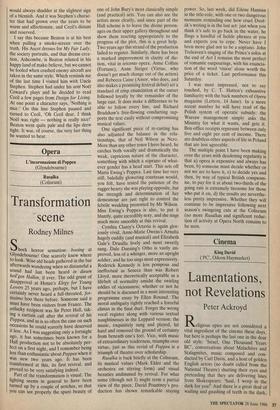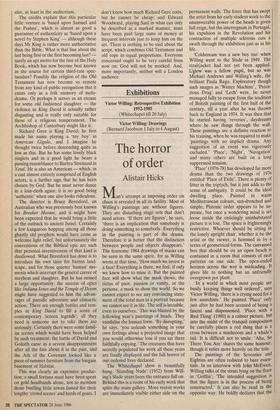Cinema
King David (`PC', Odeon Haymarket)
Lamentations, not Revelations
Peter Ackroyd
Religious epics are not considered a vital ingredient of the cinema these days, but here is perhaps the last one in the dear old style: 'Israel, One Thousand Years BC', conversations about Malachites and Stalagmites, music composed and con- ducted by Carl Davis, and a host of golden English actors (no doubt culled from the National Theatre) shutting their eyes and pretending that they are delivering lines from Shakespeare: 'Saul, I weep in the dark for you!' And there is a great deal of wailing and gnashing of teeth in the dark, also, at least in the auditorium.
The credits explain that this particular little venture is 'based upon Samuel and the Psalms', which is almost as good a guarantee of authenticity as 'based upon a novel by Stephen King' — although these days Mr King is rather more authoritative than the Bible. What is that line about the last being first or the first becoming last? surely an apt motto for the fate of the Holy Book, which has now become best known as the source for certain third-rate spec- taculars? Possibly the religion of the Old Testament has now become so remote from any kind of public recognition that it exists only as a folk memory of melo- drama. Or perhaps it serves as an excuse for some old fashioned slaughter — the violence in King David is actually rather disgusting and is really only suitable for those of a religious temperament. The Archbishop of Canterbury might like it.
Richard Gere is King David; he first made his name playing a 'toy boy' in American Gigolo, and I imagine he thought twice before descending quite as low as this. But he has some lovely black ringlets and in a good light he bears a passing resemblance to Barbra Streisand in Yentl. He is also an American — which, in a cast almost entirely comprised of English actors, is a further sign that he has been chosen by God. But he must never dance in a loin-cloth again: it is no good being 'authentic' when one also looks ridiculous.
The director is Bruce Beresford, an Australian who was previously best known for Breaker Morant, and it might have been expected that he would bring a little of the outback to ancient Israel. Certainly a few kangaroos hopping among all those ghastly old prophets would have come as welcome light relief, but unfortunately the conventions of the Biblical epic are such that personal inventiveness of that kind is disallowed. What Beresford has done is to introduce his own taste for barren land- scape, and for those quieter 'human' mo- ments which interrupt the general career of mayhem and slaughter. But he has missed a large opportunity: the success of epics like Indiana Jones and the Temple of Doom might have suggested to him the advan- tages of parodic adventure and climactic action. There are enough battles and tem- ples in King David to fill a score of contemporary 'screen legends': all they need is someone not to take them too seriously. Certainly there were some famil- iar scenes which would have been helped by such treatment: the battle of David and Goliath came as a severe disappointment after all the fuss about it in the past, and the Ark of the Covenant looked like a piece of summer furniture from the bargain basement of Habitat.
This was clearly an expensive produc- tion; a small fortune must have been spent on gold headbands alone, not to mention those bustling little towns famed for their lengthy 'crowd scenes' and herds of goats. I don't know how much Richard Gere costs, but he cannot be cheap; and Edward Woodward, playing Saul in what can only be described as a marked manner, must have been paid large sums of money at frequent intervals just to keep him on the set. There is nothing to be said about the script, which combines Old Testament and old rope in equal proportions. Everyone concerned ought to be very careful from now on: God will not be mocked. And, more importantly, neither will a London audience.



















































 Previous page
Previous page